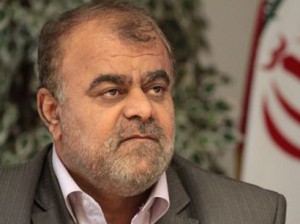 Iranian Oil Minister Rostam Qasemi says five phases of the South Pars gas field will come on stream by the end of September despite US-engineered sanctions against Iran over its nuclear energy program.
Iranian Oil Minister Rostam Qasemi says five phases of the South Pars gas field will come on stream by the end of September despite US-engineered sanctions against Iran over its nuclear energy program.Qasemi said on Friday that a large proportion of equipment required for the development of 17 phases of the giant gas field is now being supplied by domestic manufactures.
He further noted that Iran is turning sanctions into opportunities, and has managed to domestically produce the parts subject to the sanctions through close cooperation between its universities and research centers.
The South Pars gas field is located in the Persian Gulf straddling the common border between Iran and Qatar. It is estimated that the field contains 14 trillion cubic meters of gas and 18 billion barrels of condensates.
The field covers an area of 3,700 square kilometers. The gas production projects in the Pars Special Economic Energy Zone have been divided into 28 phases.
National Iranian Oil Company (NIOC) Managing Director Ahmad Qalebani announced in early June that all phases of the South Pars gas field will come on stream in the near future.
Qasemi also said that Iran will turn into a major petrol exporter once Setareh Khalij-e Fars (Persian Gulf Star) -- the country�s biggest refinery -- is operational in the southern port city of Bandar Abbas, located about 1,320 kilometers (820 miles) south of Tehran, at the beginning of the next Iranian calendar year, which begins on March 21, 2014.
He went on to say that Iran plans to mainly export its oil derivatives to its neighboring states.
Iran is engaged in talks with its neighboring countries in order to reach agreements with them over the export of natural gas, the Iranian oil minister said, stressing that the country will change its revenue source from oil to gas in the near future.
Qasemi stated that Iran is currently constructing 70 petrochemical units, and the country�s annual production of petrochemicals will jump to 100 million tons from the current 60 million tons once those projects come on stream.
At the beginning of 2012, the United States and the European Union imposed new sanctions on Iran�s oil and financial sectors.
On October 15, 2012, the EU foreign ministers agreed on another round of sanctions against Iran.
The illegal US-engineered sanctions were imposed based on the unfounded accusation that Iran is pursuing non-civilian objectives in its nuclear energy program.
Iran rejects the allegation, arguing that as a committed signatory to the nuclear Non-Proliferation Treaty (NPT) and a member of the International Atomic Energy Agency (IAEA), it has the right to use nuclear technology for peaceful purposes.
By Press TV
The Iran Project is not responsible for the content of quoted articles.










